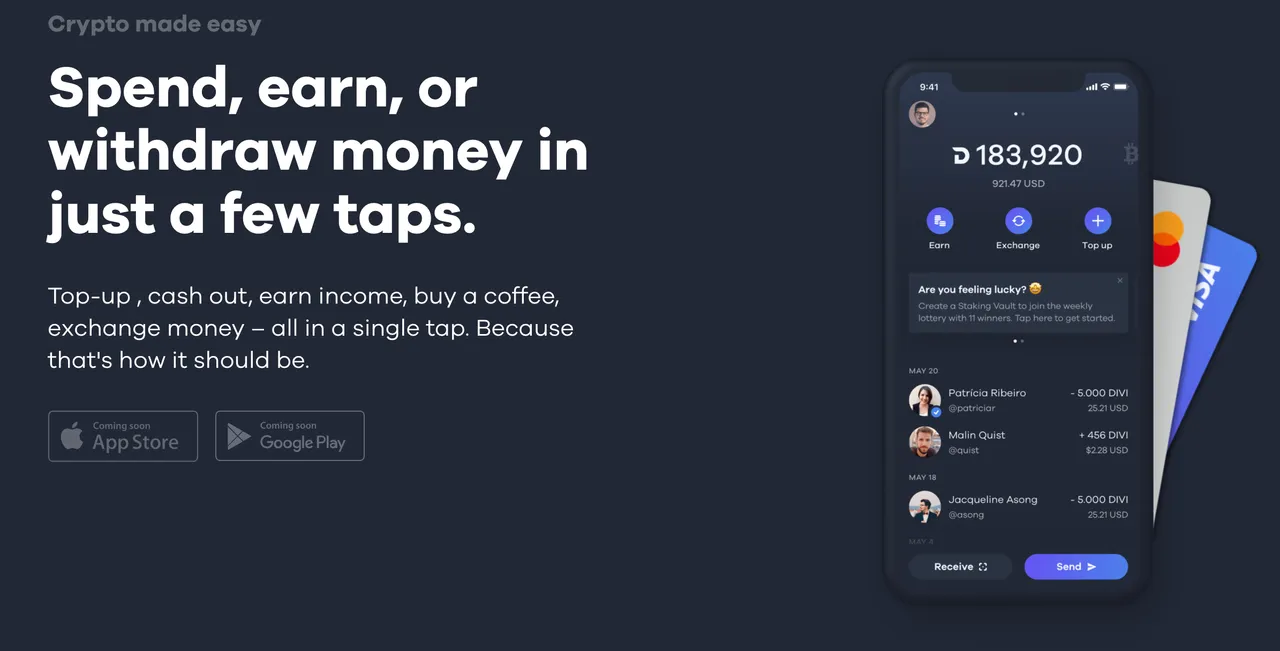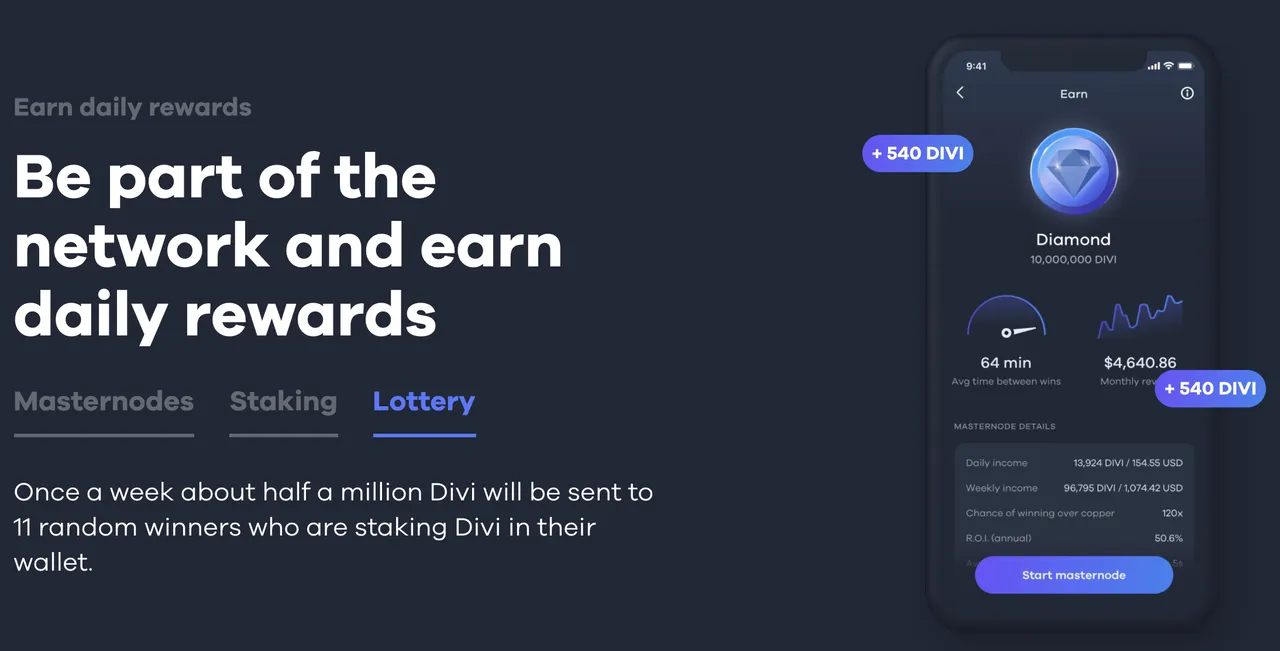DIVI - Wallet
The Divi Project has developed one of the most user-friendly crypto experiences in the industry. The desktop wallet (and soon mobile versions), offer a host of features that both keep the user secure, and enhance user experience.

Wallet Features
Lorem ipsum dolor sit amet, consectetur adipiscing elit. Ut elit tellus, luctus nec ullamcorper mattis, pulvinar dapibus leo.
Staking
Staking
Stakers (read about staking here) help secure the network by verifying transactions. Every wallet that possesses more than 10,000 DIVI is eligible to stake. Stakers are rewarded DIVI proportional to the amount of DIVI they have set aside as collateral (known as your ‘stake’). The Desktop wallet must remain synced to the network to be eligible. Staking is a simple way of Divi users helping the ecosystem, whilst they earn a passive income for the use of their computational power, time, and energy.

Masternodes
Masternodes: Divi’s Masternode one click cloud install (MOCCI)
Once the realm of the technologically savvy, The Divi Project has opened the space to anyone who wishes to participate, but may not necessarily have the technical knowledge. The key is, our Masternodes are hosted on secure servers, but your coins never leave your wallet. This allows you to harness distributed computing, but maintain a high-level of security.
MOCCI stands for Masternode one-click cloud install. It represents the simplification of the masternode process, so anyone can take part in securing the network.
Divi has created a tiered one-click system, which allows users to set up masternodes on a secure cloud server, in just a few minutes. With just one click, the once arduous process of manually installing a masternode is replaced with a simple install. The frontend process is simple. Users fund the masternode with their desired tier, select a payment plan, which covers the server hosting costs, and click deploy.
But what happens on the back-end? What processes happen that the user cannot see, but contribute to the successful installation of a masternode?
What happens when a user hits deploy?
Firstly, funds are checked to ensure the user has enough, then they are allocated to the corresponding masternode. The remote node is then installed on a remote server. To ensure decentralization of the ecosystems, the installation checks all of the existing locations of our MOCCIs, and deploys the newest node to the region with the least established nodes. Once settings are installed on the remote server, the masternode will reboot, and wait for 15 confirmations.
Where do my coins go, if the masternode is hosted remotely
Nowhere. Your coins remain in your wallet at all times. They will be unspendable, as they are allocated as collateral
Human readable addresses
A great point of friction in the cryptocurrency space are peoples wallet addresses, or ‘public keys’. The long string of characters often causes users anxiety, as users are scared of sending funds to the wrong address. Divi has come up with a novel solution: storing unique, immutable names on the blockchain, that can be used to send funds to, or connect with. This makes the transaction process faster, safer, more user friendly, and less intimidating for new users. In addition to human readable addresses, each account will be mapped one-to-one to a name, email, or phone number.
Atomic Swaps
Atomic swaps are a smart contract technology, that allow for the exchange of one cryptocurrency to another without the need to use a centralized exchange. They can be thought of as an instantaneous peer-to-peer swap of currencies. Not only are atomic swaps useful for those who wish to use multiple currencies, they also keep our users far more secure. Without the need to use third party exchanges, who are always at risk of security breaches, users can buy and sell the currencies of their choice, all from the security of their own local wallet.
Pooled masternodes
Divi’s vision has always been to create the most secure and easy to use cryptocurrency in the world. Simple additions like Pin-to-send are a great example of this. Simply choose a contact, and the amount you wish to send. Then, chose a private pin number, with a time-limit expiry. This means that only the person who knows the pin, can sign off on the transaction. Alongside named accounts and users, and human readable addresses, pin-to-send makes the possibility of sending funds to the wrong person, almost impossible.
Crypto-banking
We have a host of inventive ways to enhance the user experience inside the wallet. We envisage the integration of many ‘crypto-banking’ features, that will allow our users to better manage their finances, on their own terms. The following features are not yet available, but are in the development pipeline. Our user friendly smart-wallet will change the way people interact with their cryptocurrencies.
shares
crypto01.png?w=1200&ssl=1
Piggy Bank
The idea of the Piggy Bank is to encourage savings. The user will be able to set aside a portion of their income, that can only be accessed at a future, predetermined date.
crypto02.png?w=1200&ssl=1
Scheduled payments
This feature will allow for prompt bill payments, or any payment you wish to occur on a predetermined date. The wallet is designed to be able to send present amounts on a regular schedule.
crypto03.png?w=1200&ssl=1
Request money
The wallet will have the ability to request funds from your contacts. The contact will receive a notification, with the details of the request, and a deposit address.
crypto04.png?w=1200&ssl=1
Auto Split
Designed with business partners in mind, the autosplit feature will allow users to set a percentage threshold, which will automatically split incoming payments, and route the funds to each pocket. The autosplit feature can also be used for businesses when they receive product payments. You will be able to instantly seperate off taxes, to be paid at a later date.
Lottery Blocks
Lottery in Divi is a process of selecting 11 winners in a pseudo-random way at the end of every lottery cycle. Lottery winners are determined in every block, this is important to understand, this is not like the real-world lottery where random numbers are generated.
Lottery reward is the number of coins that are generated in every block and is added to the lottery pool.
Lottery cycle is how many blocks need to be minted to trigger new lottery.
How it works
General
Let’s pickup random values to show this on example:
Let’s pretend that we are on block 200, and it’s the end of last lottery cycle and the start of new lottery cycle. The algorithm behaves like this:
In every block, we calculate the score using the hash of coin stake and the hash of the last lottery.
After calculating the score, we save it in CBlockIndex together with 11 other winners.
At the end of the lottery cycle, block 400 in this example, minter needs to pay to the winners of the lottery.
Any peer looking on the blockchain can do the same math and tell if lottery winner is valid or no, this is important, peers can reach consensus in a decentralized way looking on their local blockchains.
I hope you had enjoyed this post regarding the DIVI Project.
I’m planning to create a few more posts about DIVI, there is more to share …wait for the next one.
DIVI is one of the best Projects for 2020.
We have a problem, they have the solution.
If you want to be part of DIVI family you can find more info at https://diviproject.org/
Also, if you didn’t signed up for the new app please click in this link =>>> https://wallet.diviproject.org/
If you want to buy some #DIVI, please click in the links below:
BITHUMB GLOBAL
MIDAS (On Midas you can be part of a #Masternode without having the full masternode)
BITRUE
Please have a look at my Library I have some good books that can help you a lot if you are a beginner in trading and Finance.
Cheers
Smart Money